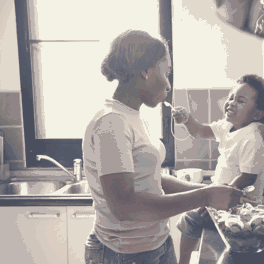The Best Interests of the Child
In the United Kingdom, the primary consideration in the ‘care of children’ cases is the best interests of the child. The courts are committed to ensuring that any arrangement promotes the child's welfare, safety, and happiness. This means that factors like the child's emotional and physical well-being, education, and general quality of life are given top priority.
Does income play a role in care decisions?
While a parent's financial situation is considered during child arrangement order proceedings, it is just one of many factors considered. The courts aim to assess whether each parent can provide for the child's needs, both financially and emotionally. Financial stability is important, but it does not automatically determine where the child will live and who they will spend time with.
In the UK, when a court handles a children’s’ care and living arrangements case, the court focuses on what's best for the child.

They consider several factors, such as:
- How stable both parents are.
- How the child's care is arranged.
- Who mainly cared for the child before this case came about
- Issues like drug or alcohol use.
- The mental and physical health of the parents.
- Any signs of domestic abuse by either parent.
- Evidence of child abuse, neglect, or abandonment.
- The child's own preference for living with a particular parent.
- Where the child's siblings live.
- Educational opportunities for the child.
- The court's own observations of the parents.
- Each parent's financial situation.
When it comes to finances, the court assesses the parents' ability to provide for the child. For example, if one parent is homeless, it's less likely they'll get to care for the child because they can't offer suitable housing for the child. It's essential to understand that the child's well-being and interests come first in these decisions.
How Does the Court Decide Who Gets To Care For The Child?
There are certain things that the Court take into consideration when deciding who gets child care and where the child should live. The Court understands that just because one parent has more money, it doesn’t mean that they may be the best person for the child to live with. The Court also considers:
- The child’s wishes and feelings
- How the changes may affect the child
- The child’s age, gender, characteristics and background
- Any possible risk of harm to the child
- The child’s physical and emotional needs
- The educational needs of the child
- Ability of the parents to meet the child’s needs
Ideally, a Court would put a Shared Care Arrangement in place, as being able to spend time with both parents is generally in most children’s best interests. We understand that every case is different and our specialist Family Law Solicitors will tailor our service to your needs and circumstances.
What is a Shared Care Arrangement?
A shared care order is a legal arrangement, defined in the Child Act, where a child lives with both parents for a set period. Instead of using the term 'custody,' these orders are now referred to as 'Child Living Arrangements.'
In the past, ‘child custody’ determined where the child lived, and the resident parent made most decisions, leaving the non-resident parent with little authority. However, in 2014, the Children Act 1989 was amended, replacing older terms like custody, residence, and contact orders with the term 'child arrangement orders.' These orders address:
- Where the child will live.
- Who the child will have contact with.
- Specific issue orders.
- Prohibited steps orders.
The Children Act 1989 introduced the concept of 'parental responsibility,' giving those with it the right to make significant decisions for the child. All parties with parental responsibility have equal authority. If they can't agree, the court can issue a 'prohibited steps order' to prevent a specific action or a 'specific issue order' to allow it.
Understanding the Process for a Child Arrangement Order
The Courts are often reluctant to prevent one parent from seeing their child indefinitely. To do this the Court would need to see clear evidence that the other parent is unfit to look after the child, or if the child is at risk of harm, for example if one parent has shown abusive behaviour. Even then, they may allow the other parent to have supervised visits with the child.
If you cannot agree on who will care for the child, and you have tried mediation, you will need to apply for a Child Arrangement Order. This determines where the child will live and how much contact the child will have with each parent.
We can help you apply for a Child Arrangement Order or you can apply yourself. You will need to download and fill in a C100 form. HM Government provide guidance on how to do this on gov.co.uk, but it is recommended that you get legal advice from a Family and Child Law Solicitor beforehand.
When applying for a Child Arrangement Order, you will need to prove that you have tried to agree with the other parent through mediation first. The Court fee to apply for a Child Arrangement Order is £232.

Why Might a Court Not Allow Shared Care
It is very rare that the Court won’t allow a parent to see their child at all. If this is the case, it is likely to be because one parent has shown signs of abuse or that they may harm the child in some way.
A Court may not always order a Shared Care Arrangement. Sometimes they order that a child must live with one parent and spend time with another. This means that time is not always equally split between both parents. For example, the Child Arrangement Order might outline that one parent only sees the child just one or two days a week.
Unless one parent has a negative impact on the child’s wellbeing, the Court will rarely exclude one parent entirely from the child’s life.
If you need help with a Child Arrangement Order, get in touch with our Family and Child Law Solicitors for legal advice tailored to your unique circumstances.
Important Things to Consider
Often it is easy to get overwhelmed during a separation or divorce and forget to put your child’s wellbeing before any disputes you may be having with your ex-partner.
Before making any decisions about where your child should live, you should consider:
- Who has the most time to look after the children and spend time with them?
- Is where you want them to live going to be convenient for them?
- How will their preferences change over time?
- What if they start at a new school, which means they have to travel long distances?
- How will you stay in touch if your children don’t live with you?
- How far away will you live from the other parent and how will this impact on the time with the children?
- How can you ensure that the children’s routine is disrupted as little as possible?
It’s important to put the child’s best interests first. If you can, you should try discussing these questions with the child’s other parent and working together to come to an agreement. If you and your ex-partner cannot agree, you will need to try and work through your disputes through mediation before you go to Court.
Court Proceedings can be long-winded and difficult for both you and your child. The cost of Court Proceedings can also be a great deal more than mediation and it will take a lot longer to reach a solution through the Court.
Our Divorce Solicitors understand how stressful child arrangement order issues can be. We will speak to you without using legal jargon and offer the best advice tailored to your and your child’s needs.









